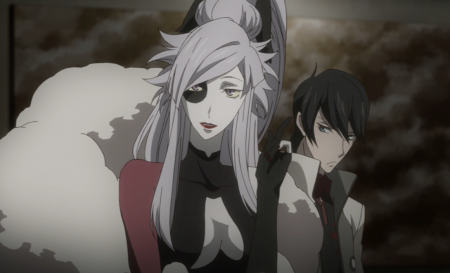Ask John: What’s Wrong With Un-Go?

Question:
A little while back, you referred to Un-Go as a disappointing series so far. I am thoroughly enjoying this strange detective tale and I was curious as to what exactly you found at fault with it.
Answer:
I think that I can represent a majority American reaction to the current Un-Go anime television series by calling it disappointing. The series comes from an all-star production staff that includes screenwriter Shou Aikawa – the writer of anime including Fullmetal Alchemist, The Twelve Kingdoms, and Oh! Edo Rocket, and direction by Fullmetal Alchemist & Gundam 00 director Seiji Mizushima. Furthermore, the series is loosely inspired by the contemporary classic Japanese fiction of late author Ango Sakaguchi. Such names, combined with the show’s status as a Noitamina series and the announcement that the show would get a prologue feature film – rare and exceptional treatment for a short TV anime series – all created nearly stratospheric expectations for the program. However, its first five episodes appear to hinge upon a tenuous conceit, and the show casually ignores vital components necessary to establish itself as a convincing and satisfying detective mystery.
Un-go occurs in a slight future alternate Japan and follows a private detective (who appears to work without charging any fees) that rivals an influential government sponsored genius who frequently takes credit for the detective’s deductions. The set-up is intriguing. Government sponsored detective Rinroku Kaishou is not as insightful as the public believes, nor is he as moral as the public probably assumes. He serves the public interest, which may sometimes contradict serving justice. However, while Un-Go has an intriguing concept, the program consistently and frequently undermines itself with plot holes, leaps in logic, and unexplained circumstances.
The first episode introduces detective Shinjuro Yuki and his partner Inga at an upscale party but fails to explain why Shinjuro and Yuki are present. The first episode also reveals the detective show’s unique concept of combining supernatural intimidation with astute guesswork to stand in for actual investigation and deduction. Forcing a witness to reveal a secret, then accepting that the revelation is truthful without verification, would be unethical, if not unthinkable, in any other detective drama. Yet in Un-Go the practice is simply accepted without question by all parties. At least the first episode does include some minor logical deduction that can pass for investigation.
The second episode begins with a mysterious suitcase delivered to a particular address. The episode never explains why the suitcase was delivered to its particular destination. The involvement of a scapegoat character gets referred to briefly, yet the cause of his death is never addressed. The killer at the core of the mystery is abundantly obvious because the killer’s behavior is so wildly inappropriate as to be immediately suspicious. Ultimately, the episode hinges around protecting a political secret which ends up getting released anyway, undermining, granted, possibly by ironic intent, the entire purpose of the episode’s events and actions.
The two-part third and fourth episodes seem to pander to otaku convention by introducing a scantily dressed Lolita. The episode reveals that Shinjuro deduces the identity of a victim seemingly based entirely on deductive guesswork, without any substantiation, and correctly guesses the mystery’s perpetrator, again, as little more than a lucky guess.
The series’ fifth episode attempts to reveal Shinjuro’s philosophy, but the attempt is unsatisfying and unconvincing because it has an inadequate foundation. Shinjuro asserts that he rejects the concept of martyrs but then has to eat his words when presented with a rebuttal that he can’t refute. Shinjuro, the professional detective, then makes a wild deduction and makes an incorrect accusation, except the episode later reveals that the accusation was partially correct when Shinjuro reveals a secret which he had no way of knowing. Once again, the resolution to the mystery is based more on unsubstianted guesswork than actual investigation and deduction.
The argument may be made that the show’s jumpy editing, frequent retroactive explanations of setting and situation, and self-contradiction are all exemplary of the program simply challenging viewers to pay close attention, and the show’s ironic compromise of conventional narrative goals and characterization building are conscious meta-literary techniques. But sometimes a banana is just a banana, and these flaws in Un-Go may be simply representative of sloppy production. With only half of the show complete, so far, viewers can only speculate on whether the show’s second half will elevate or just remain steady. The later half of the show may reveal that the show’s seeming flaws, lapses, and contradictions may be intentional building blocks for deconstructive, satiristic reflection. The show’s second half may also reveal that the show has simply been an under-written and under-developed mish-mash of good ideas lacking cohesion.
Add a Comment
You must be logged in to post a comment.


It also doesn’t help that Un-Go reminds me a lot of Umineko …… XD
I have personally enjoyed every single episode! Although, I do see your point, I think that is whats drawing me to this show.
I enjoy the show, but I have come to realize its faults. I dislike magic coming into play, especially when I feel that it’s unnecessary. Also, I don’t know if at times I follow how the mystery was resolved. I’m not a dummy, but there have been a couple eps where I felt I was supposed to feel an impact, but I just got bewildered.
Still, I think that it’s worth watching over the same ol’ offered this season.